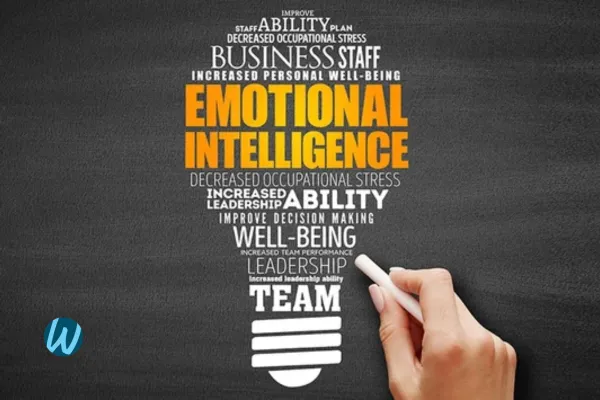
Invite Chip to speak at your next event.

Leadership Lessons

Emotional Intelligence & Self-Awareness
Emotional Intelligence & Self-Awareness
Scripture: Proverbs 16:32
“Better a patient person than a warrior, one with self-control than one who takes a city.”
When we think about leadership, we often think of strength, decisiveness, and power. Yet, Proverbs 16:32 challenges that notion by placing patience and self-control as higher virtues than raw power. True leadership isn’t about overpowering others but about mastering yourself—your emotions, impulses, and actions.
This idea ties directly to Emotional Intelligence (EQ), a concept popularized by Daniel Goleman. Goleman’s work has shown that successful leadership isn’t just about IQ or technical skills; it's about how well we understand and manage our own emotions and how we navigate our relationships with others. In this week’s discussion, we’ll explore the critical role of emotional intelligence in leadership and why self-awareness is foundational for leading others.
What is Emotional Intelligence?
Daniel Goleman broke emotional intelligence into five key components:
Self-awareness: The ability to recognize and understand your own emotions.
Self-regulation: The ability to manage your emotional responses.
Motivation: Being driven to achieve for the sake of accomplishment.
Empathy: Understanding the emotions of others.
Social skills: Managing relationships effectively.
In leadership, all of these components are essential, but self-awareness is where it all begins.
Why Self-Awareness Matters
Proverbs 16:32 highlights patience and self-control, which are direct results of self-awareness. When you know yourself—your strengths, weaknesses, triggers, and values—you are better equipped to make wise decisions. You no longer act out of impulse or emotion but respond thoughtfully, with patience and wisdom.
Self-awareness allows leaders to recognize when they are feeling frustrated or stressed before those emotions affect their decision-making. It also helps leaders avoid the ego traps that can derail progress. Leaders who lack self-awareness may misjudge situations, overestimate their abilities, or miss critical feedback from their teams.
Leading with Patience and Self-Control
As a leader, there will always be pressure to act swiftly, often leading to hasty decisions. The warrior mentality, as referenced in Proverbs, can tempt us to “take the city” by force. However, Goleman’s research and biblical wisdom both remind us that restraint, reflection, and emotional mastery are more powerful.
Imagine you're in a heated meeting. Tempers flare, disagreements arise, and the room feels tense. A leader lacking emotional intelligence might jump in to assert dominance or defend their position, likely escalating the situation. But a leader with self-awareness and emotional control recognizes the emotional dynamics in the room and pauses. Instead of reacting, they assess the situation, breathe, and respond with calmness, asking questions rather than making demands. That approach defuses tension and builds trust.
Growing in Emotional Intelligence
Like all leadership skills, emotional intelligence can be developed. Here are some practical steps you can take to grow in self-awareness and emotional intelligence:
Practice Reflection: At the end of each day, take time to reflect on your emotional responses. What situations triggered frustration, stress, or impatience? How did you handle those emotions? What could you have done differently?
Seek Feedback: Ask trusted colleagues, mentors, or friends for honest feedback. How do they perceive your emotional responses and leadership? What blind spots might you have?
Mindfulness and Prayer: Spend time in prayer, asking God to reveal areas where you struggle with self-control or patience. Practicing mindfulness can help you become more aware of your emotions as they arise, allowing you to address them before they influence your behavior.
Study the Life of Jesus: Jesus demonstrated emotional intelligence throughout His ministry. He showed empathy, knew when to speak and when to remain silent, and always led with love. Studying His example can provide profound insights into how we should lead.
Daniel Goleman’s Legacy
Goleman’s work on emotional intelligence continues to influence leadership development around the world. He made it clear that leadership isn't about being the loudest voice in the room; it’s about understanding ourselves and others on a deeper level. Great leaders don’t dominate—they inspire, empathize, and lead with emotional wisdom.
The Bible gives us the same message. Proverbs 16:32 reminds us that self-mastery is a greater achievement than taking over a city. As Christian leaders, we are called to live and lead with patience, self-control, and emotional intelligence, modeling our leadership after the ultimate example of Jesus.
As you continue your leadership journey, remember that growing in emotional intelligence is a lifelong process. But by embracing self-awareness, self-control, and empathy, you will not only lead others more effectively but also reflect Christ’s love and wisdom in every interaction.
Discussion Questions for Your Audience:
How can emotional intelligence improve your leadership in everyday situations?
In what areas of your life do you struggle with self-awareness or self-control?
Can you recall a situation where exercising emotional intelligence helped resolve a conflict or challenge in your leadership?
Donor Development

Emotional Intelligence & Self-Awareness
Emotional Intelligence & Self-Awareness
Scripture: Proverbs 16:32
“Better a patient person than a warrior, one with self-control than one who takes a city.”
When we think about leadership, we often think of strength, decisiveness, and power. Yet, Proverbs 16:32 challenges that notion by placing patience and self-control as higher virtues than raw power. True leadership isn’t about overpowering others but about mastering yourself—your emotions, impulses, and actions.
This idea ties directly to Emotional Intelligence (EQ), a concept popularized by Daniel Goleman. Goleman’s work has shown that successful leadership isn’t just about IQ or technical skills; it's about how well we understand and manage our own emotions and how we navigate our relationships with others. In this week’s discussion, we’ll explore the critical role of emotional intelligence in leadership and why self-awareness is foundational for leading others.
What is Emotional Intelligence?
Daniel Goleman broke emotional intelligence into five key components:
Self-awareness: The ability to recognize and understand your own emotions.
Self-regulation: The ability to manage your emotional responses.
Motivation: Being driven to achieve for the sake of accomplishment.
Empathy: Understanding the emotions of others.
Social skills: Managing relationships effectively.
In leadership, all of these components are essential, but self-awareness is where it all begins.
Why Self-Awareness Matters
Proverbs 16:32 highlights patience and self-control, which are direct results of self-awareness. When you know yourself—your strengths, weaknesses, triggers, and values—you are better equipped to make wise decisions. You no longer act out of impulse or emotion but respond thoughtfully, with patience and wisdom.
Self-awareness allows leaders to recognize when they are feeling frustrated or stressed before those emotions affect their decision-making. It also helps leaders avoid the ego traps that can derail progress. Leaders who lack self-awareness may misjudge situations, overestimate their abilities, or miss critical feedback from their teams.
Leading with Patience and Self-Control
As a leader, there will always be pressure to act swiftly, often leading to hasty decisions. The warrior mentality, as referenced in Proverbs, can tempt us to “take the city” by force. However, Goleman’s research and biblical wisdom both remind us that restraint, reflection, and emotional mastery are more powerful.
Imagine you're in a heated meeting. Tempers flare, disagreements arise, and the room feels tense. A leader lacking emotional intelligence might jump in to assert dominance or defend their position, likely escalating the situation. But a leader with self-awareness and emotional control recognizes the emotional dynamics in the room and pauses. Instead of reacting, they assess the situation, breathe, and respond with calmness, asking questions rather than making demands. That approach defuses tension and builds trust.
Growing in Emotional Intelligence
Like all leadership skills, emotional intelligence can be developed. Here are some practical steps you can take to grow in self-awareness and emotional intelligence:
Practice Reflection: At the end of each day, take time to reflect on your emotional responses. What situations triggered frustration, stress, or impatience? How did you handle those emotions? What could you have done differently?
Seek Feedback: Ask trusted colleagues, mentors, or friends for honest feedback. How do they perceive your emotional responses and leadership? What blind spots might you have?
Mindfulness and Prayer: Spend time in prayer, asking God to reveal areas where you struggle with self-control or patience. Practicing mindfulness can help you become more aware of your emotions as they arise, allowing you to address them before they influence your behavior.
Study the Life of Jesus: Jesus demonstrated emotional intelligence throughout His ministry. He showed empathy, knew when to speak and when to remain silent, and always led with love. Studying His example can provide profound insights into how we should lead.
Daniel Goleman’s Legacy
Goleman’s work on emotional intelligence continues to influence leadership development around the world. He made it clear that leadership isn't about being the loudest voice in the room; it’s about understanding ourselves and others on a deeper level. Great leaders don’t dominate—they inspire, empathize, and lead with emotional wisdom.
The Bible gives us the same message. Proverbs 16:32 reminds us that self-mastery is a greater achievement than taking over a city. As Christian leaders, we are called to live and lead with patience, self-control, and emotional intelligence, modeling our leadership after the ultimate example of Jesus.
As you continue your leadership journey, remember that growing in emotional intelligence is a lifelong process. But by embracing self-awareness, self-control, and empathy, you will not only lead others more effectively but also reflect Christ’s love and wisdom in every interaction.
Discussion Questions for Your Audience:
How can emotional intelligence improve your leadership in everyday situations?
In what areas of your life do you struggle with self-awareness or self-control?
Can you recall a situation where exercising emotional intelligence helped resolve a conflict or challenge in your leadership?
Devotionals

Emotional Intelligence & Self-Awareness
Emotional Intelligence & Self-Awareness
Scripture: Proverbs 16:32
“Better a patient person than a warrior, one with self-control than one who takes a city.”
When we think about leadership, we often think of strength, decisiveness, and power. Yet, Proverbs 16:32 challenges that notion by placing patience and self-control as higher virtues than raw power. True leadership isn’t about overpowering others but about mastering yourself—your emotions, impulses, and actions.
This idea ties directly to Emotional Intelligence (EQ), a concept popularized by Daniel Goleman. Goleman’s work has shown that successful leadership isn’t just about IQ or technical skills; it's about how well we understand and manage our own emotions and how we navigate our relationships with others. In this week’s discussion, we’ll explore the critical role of emotional intelligence in leadership and why self-awareness is foundational for leading others.
What is Emotional Intelligence?
Daniel Goleman broke emotional intelligence into five key components:
Self-awareness: The ability to recognize and understand your own emotions.
Self-regulation: The ability to manage your emotional responses.
Motivation: Being driven to achieve for the sake of accomplishment.
Empathy: Understanding the emotions of others.
Social skills: Managing relationships effectively.
In leadership, all of these components are essential, but self-awareness is where it all begins.
Why Self-Awareness Matters
Proverbs 16:32 highlights patience and self-control, which are direct results of self-awareness. When you know yourself—your strengths, weaknesses, triggers, and values—you are better equipped to make wise decisions. You no longer act out of impulse or emotion but respond thoughtfully, with patience and wisdom.
Self-awareness allows leaders to recognize when they are feeling frustrated or stressed before those emotions affect their decision-making. It also helps leaders avoid the ego traps that can derail progress. Leaders who lack self-awareness may misjudge situations, overestimate their abilities, or miss critical feedback from their teams.
Leading with Patience and Self-Control
As a leader, there will always be pressure to act swiftly, often leading to hasty decisions. The warrior mentality, as referenced in Proverbs, can tempt us to “take the city” by force. However, Goleman’s research and biblical wisdom both remind us that restraint, reflection, and emotional mastery are more powerful.
Imagine you're in a heated meeting. Tempers flare, disagreements arise, and the room feels tense. A leader lacking emotional intelligence might jump in to assert dominance or defend their position, likely escalating the situation. But a leader with self-awareness and emotional control recognizes the emotional dynamics in the room and pauses. Instead of reacting, they assess the situation, breathe, and respond with calmness, asking questions rather than making demands. That approach defuses tension and builds trust.
Growing in Emotional Intelligence
Like all leadership skills, emotional intelligence can be developed. Here are some practical steps you can take to grow in self-awareness and emotional intelligence:
Practice Reflection: At the end of each day, take time to reflect on your emotional responses. What situations triggered frustration, stress, or impatience? How did you handle those emotions? What could you have done differently?
Seek Feedback: Ask trusted colleagues, mentors, or friends for honest feedback. How do they perceive your emotional responses and leadership? What blind spots might you have?
Mindfulness and Prayer: Spend time in prayer, asking God to reveal areas where you struggle with self-control or patience. Practicing mindfulness can help you become more aware of your emotions as they arise, allowing you to address them before they influence your behavior.
Study the Life of Jesus: Jesus demonstrated emotional intelligence throughout His ministry. He showed empathy, knew when to speak and when to remain silent, and always led with love. Studying His example can provide profound insights into how we should lead.
Daniel Goleman’s Legacy
Goleman’s work on emotional intelligence continues to influence leadership development around the world. He made it clear that leadership isn't about being the loudest voice in the room; it’s about understanding ourselves and others on a deeper level. Great leaders don’t dominate—they inspire, empathize, and lead with emotional wisdom.
The Bible gives us the same message. Proverbs 16:32 reminds us that self-mastery is a greater achievement than taking over a city. As Christian leaders, we are called to live and lead with patience, self-control, and emotional intelligence, modeling our leadership after the ultimate example of Jesus.
As you continue your leadership journey, remember that growing in emotional intelligence is a lifelong process. But by embracing self-awareness, self-control, and empathy, you will not only lead others more effectively but also reflect Christ’s love and wisdom in every interaction.
Discussion Questions for Your Audience:
How can emotional intelligence improve your leadership in everyday situations?
In what areas of your life do you struggle with self-awareness or self-control?
Can you recall a situation where exercising emotional intelligence helped resolve a conflict or challenge in your leadership?
